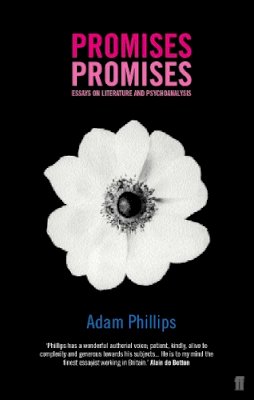21%OFF

Stock image for illustration purposes only - book cover, edition or condition may vary.
Promises, Promises
Adam Phillips
€ 19.99
€ 15.76
FREE Delivery in Ireland
Description for Promises, Promises
Paperback. This is a collection of essays that sets out to make and break the links between psychoanalysis and literature. It gives insights into anorexia and cloning, the work of Tom Stoppard and A.E. Housman, the effect of the Blitz on Londoners, Nijinsky's diary and Martin Amis's "Night Train". Num Pages: 400 pages. BIC Classification: DN; DS; JMAF. Category: (G) General (US: Trade). Dimension: 197 x 128 x 22. Weight in Grams: 260.
Has psychoanalysis failed to keep its promise? What are psychoanalysis and literature good for? And what, if anything, have they got to do with each other? Promises, Promises is a delightful new collection of essays which sets out to make and break the links between psychoanalysis and literature. It confirms Adam Phillips as a virtuoso performer able to reach far beyond the borders of psychoanalytic discourse into art, drama, poetry and history. This collection gives us insights into anorexia and cloning, the work of Tom Stoppard and A.E. Housman, the effect of the Blitz on Londoners, Nijinsky's diary and Martin ... Read more
Show LessProduct Details
Publisher
Faber & Faber
Number of pages
400
Format
Paperback
Publication date
2002
Condition
New
Number of Pages
400
Place of Publication
London, United Kingdom
ISBN
9780571209736
SKU
V9780571209736
Shipping Time
Usually ships in 4 to 8 working days
Ref
99-2
About Adam Phillips
Adam Phillips was born in Cardiff in 1954. He is the author of numerous works of psychotherapy and literary criticism, including Winnicott, On Kissing, Tickling, and Being Bored, Going Sane, Side Effects, On Kindness, co-written with Barbara Taylor, On Balance, Missing Out, One Way and Another and Becoming Freud. Adam Phillips is a practising psychoanalyst and a visiting professor ... Read more
Reviews for Promises, Promises
'He writes compellingly... Because he loves literature and plainly loves writing too, Adam Phillips makes psychoanalysis plausible to the outsider. By questioning its aims and qualifying its claims, he reduces its scientific pretensions but makes it a lot more credible as therapy.' Christian Tyler, Financial Times; 'A brilliant collection of essays around the subjects in which Phillips excels.' Melvyn Bragg, ... Read more
